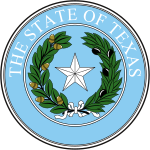
Back Gouverneurswahl in Texas 2018 German Elección para gobernador de Texas de 2018 Spanish Élection gouvernorale de 2018 au Texas French Elezioni governatoriali in Texas del 2018 Italian
| |||||||||||||||||
| Turnout | 53.01% (of registered voters) 42.07% (of voting age population)[1] | ||||||||||||||||
|---|---|---|---|---|---|---|---|---|---|---|---|---|---|---|---|---|---|
| |||||||||||||||||
Abbott: 40–50% 50–60% 60–70% 70–80% 80–90% >90% Valdez: 40–50% 50–60% 60–70% 70–80% 80–90% >90% Tie: 40–50% 50% No data | |||||||||||||||||
| |||||||||||||||||
| Elections in Texas |
|---|
 |
|
|
The 2018 Texas gubernatorial election took place on November 6, 2018, to elect the governor of Texas, concurrently with the election of Texas's Class I U.S. Senate seat, as well as other congressional, state and local elections throughout the United States and Texas. Incumbent Republican governor Greg Abbott won re-election to a second term in office[2] defeating Democratic nominee Lupe Valdez, the former sheriff of Dallas County, and Libertarian nominee Mark Tippetts, a former member of the Lago Vista city council.
The Republican and Democratic party primaries were held on March 6, 2018, making them the first primaries of the 2018 electoral season.[3] Abbott won the March 6 primary with 90% of the vote to receive the Republican nomination, while Democratic candidates Lupe Valdez and Andrew White advanced to a May 22 runoff.[4] Valdez defeated White in the runoff with 53.1% of the vote and faced Abbott in the general election as the Democratic nominee.[5]
Valdez's nomination made her the first openly gay person nominated for governor by a major party in the state.[6]
Tippetts was nominated at the Libertarian Party of Texas' state convention in Houston April 13–15, 2018. He defeated three challengers, as well as the None Of The Above option, on the first ballot and received more than 70% approval from Libertarian party delegates.
Despite considerably closer contests in other Texas state elections, Abbott handily won a second term with the highest margin of victory of any state official on the ballot, although Valdez also won the largest vote share for a Democratic gubernatorial candidate since Ann Richards in 1994.[7] Tippetts' showing exceeded the previous record for most votes for a Libertarian nominee for Texas governor; that record had been set in 1990.
The election also took place alongside a closer, higher-profile Senate race between Beto O'Rourke and Ted Cruz, which may have played a factor in making the Democratic gubernatorial candidate considerably more competitive than in 2014. Abbott won a majority among white voters (72% to 26%), while Valdez won majorities among African Americans (80% to 16%) and Latinos (63% to 35%).[8]
- ^ "Turnout and Voter Registration Figures (1970-current)". www.sos.state.tx.us. Retrieved September 24, 2021.
- ^ "Greg Abbott to announce re-election bid Friday in San Antonio". Statesman.com. July 12, 2017. Retrieved February 27, 2018.
- ^ "Texas 2018 General Election". The Green Papers. Retrieved December 10, 2017.
- ^ Svitek, Patrick. "Valdez, White headed to runoff in Democratic gubernatorial primary." Texas Tribune. Mar. 6, 2018.
- ^ Svitek, Patrick; Formby, Brandon (May 22, 2018). "Lupe Valdez becomes first openly gay and first Latina candidate to win a major party nomination for Texas governor". The Texas Tribune. Retrieved May 22, 2018.
- ^ Ruiz-Grossman, Sarah (May 22, 2018). "Lupe Valdez Makes History In Texas By Winning Democratic Nod For Governor". Huffington Post. Retrieved May 22, 2018.
- ^ "Gov. Greg Abbott Clinches Second Term as GOP Wins Closest Statewide Races in 20 Years". The Texas Tribune. November 7, 2018. Retrieved November 16, 2018.
- ^ "Voter Analysis - Fox News Midterms 2018 America's Election HQ". Fox News. August 8, 2021.




